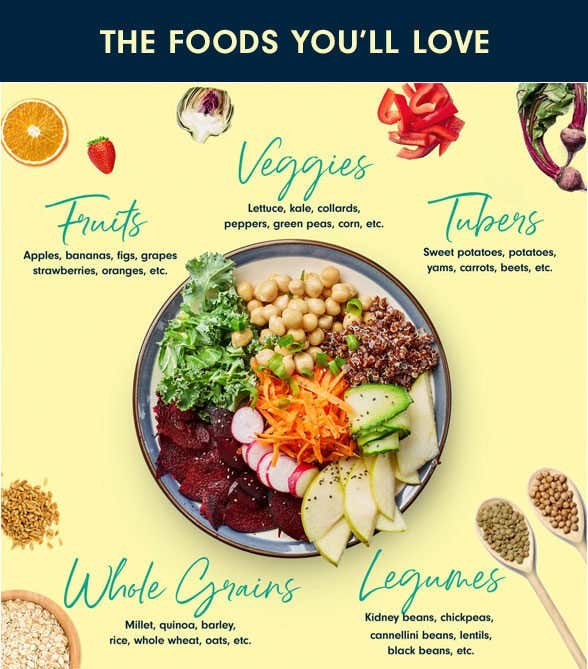The Ultimate Sugar Free Sauces Taste Test: Which One Wins?
All Concerning Healthy And Balanced Food: Benefits of Embracing Plant Based Options
The discussion bordering plant-based diets has acquired significant interest in the last few years. Numerous people are checking out the prospective health and wellness benefits, dietary advantages, and ecological influences related to these nutritional selections. As individuals come to be more aware of their food's impact on well-being and sustainability, inquiries emerge concerning the usefulness of embracing such a way of life. What certain modifications can one expect, and how might these choices improve not just individual health and wellness but additionally the planet's future?
Comprehending Plant-Based Diets
Several people link plant-based diets mostly with vegetarianism or veganism, these diet regimens can include a large array of eating patterns that focus on entire, minimally processed plant foods. Such diets often consist of fruits, vegetables, entire grains, seeds, nuts, and vegetables, while getting rid of or limiting animal products. This versatility allows individuals to customize their dietary selections according to dietary requirements and personal choices. Some may take on a primarily plant-based diet plan while still occasionally consuming meat or dairy, often referred to as a flexitarian method. The emphasis stays on integrating more plant foods, which can bring about a varied variety of flavors and dishes. Understanding these various analyses of plant-based consuming is necessary for appreciating its accessibility and appeal in modern food culture.
Wellness Conveniences of Plant-Based Foods
The health benefits of plant-based foods are considerable, using a nutrient density advantage that sustains general wellness. Study shows that these foods can boost heart health and play a vital duty in effective weight management. By including extra plant-based choices, people might improve their nutritional choices and promote long-term wellness.
Nutrient Density Benefit
Nutrient thickness plays an important duty in the health advantages of plant-based foods, making them an engaging option for those looking for a balanced diet regimen. Plant-based foods, such as fruits, vegetables, legumes, nuts, and whole grains, are typically abundant in essential vitamins, minerals, and anti-oxidants while being reduced in calories. This high nutrient density enables individuals to consume less calories while still satisfying their dietary needs. Furthermore, these foods are packed with nutritional fiber, promoting digestion health and wellness and aiding in weight management. By including nutrient-dense plant-based options, customers can enhance their general health, support their body immune systems, and lower the risk of chronic conditions. Ultimately, the nutrient thickness of plant-based foods underscores their significance in a health-conscious lifestyle.
Heart Health And Wellness Improvement

Weight Monitoring Assistance
Along with promoting heart health and wellness, a plant-based diet regimen can considerably help in weight management. This nutritional approach emphasizes entire foods such as fruits, vegetables, legumes, nuts, and entire grains, which are generally lower in calories and higher in fiber contrasted to animal-based products. The high fiber material assists increase satiation, lowering overall calorie intake. Plant-based diets are often abundant in crucial nutrients while low in undesirable fats, making it simpler to maintain a healthy weight. Research study indicates that individuals that adopt a plant-based way of life often tend to have lower body mass indexes (BMIs) and experience more successful weight loss compared to those who take in meat-heavy diets. As a result, accepting plant-based choices is a critical selection for efficient weight management
Nutritional Value of Plant-Based Ingredients
Plant-based components are rich in necessary nutrients, supplying a varied selection of vitamins, minerals, and anti-oxidants that add to general health and wellness. A contrast of healthy protein resources exposes that while pet products are typically deemed premium, several plant-based alternatives supply appropriate healthy protein and various other helpful compounds. Comprehending the nutritional value of these active ingredients can aid people make educated dietary choices.
Vital Nutrients in Plants
Nutrient-rich ingredients found in plants offer a varied variety of vital minerals and vitamins that add considerably to general health. These ingredients are abundant in vitamins A, C, and K, which support immune function, vision, and blood clot, respectively. On top of that, plants give crucial minerals such as magnesium, calcium, and potassium, important for heart health, muscular tissue function, and bone toughness. The existence of fiber in plant-based foods aids food digestion and promotes a healthy and balanced digestive tract microbiome. Antioxidants, discovered abundantly in vegetables and fruits, aid battle oxidative stress and minimize inflammation. In addition, numerous plant foods are reduced in calories yet high in nutrients, making them an outstanding selection for those seeking to keep a healthy weight while making sure perfect nutrient consumption.
Comparing Healthy Protein Resources
Healthy protein sources vary substantially in their dietary accounts, with plant-based ingredients offering unique benefits. Unlike pet healthy proteins, which commonly consist of saturated fats and cholesterol, plant proteins often tend to be reduced in these undesirable components. Legumes, nuts, seeds, and entire grains are abundant in vital amino acids, fiber, vitamins, and minerals. Lentils provide high healthy view publisher site protein material alongside substantial iron and folate, while quinoa is a total healthy protein, using all nine necessary amino acids. Furthermore, plant-based healthy proteins are typically accompanied by anti-oxidants and phytochemicals that support total health and wellness. The change to plant-based protein resources not only boosts nutritional consumption but additionally aligns with lasting dietary methods, reducing ecological impact and promoting lasting health and wellness advantages.
Environmental Effect of Plant-Based Consuming
As understanding of environment change grows, several individuals are checking out lasting dietary options that can greatly reduce their ecological footprint. Plant-based eating has actually become a significant factor to decreasing greenhouse gas exhausts, which are mainly connected with animals manufacturing. The cultivation of fruits, veggies, legumes, and grains generally needs less sources, such as water and land, contrasted to pet farming. Additionally, plant-based diets can cause reduced logging, as much less land is required for grazing animals or growing animal feed. By shifting towards plant-based choices, consumers can support biodiversity and promote healthier ecological communities. Overall, embracing plant-based eating not only benefits personal health but also represents an important step toward environmental sustainability and conservation initiatives.
Conquering Common Misconceptions
While several people identify the advantages of a plant-based diet regimen, a number of false impressions usually deter them from totally welcoming this way of living. A typical belief is that plant-based diet plans lack enough healthy protein; nonetheless, many plant sources, such as legumes, nuts, and tofu, provide ample healthy protein. Furthermore, some presume that this diet is pricey, when as a matter of fact, staples like beans, rice, and seasonal veggies can be quite economical. Another misconception is that plant-based consuming is overly limiting, whereas it in fact provides a varied range of foods and flavors. Lastly, numerous stress that a plant-based diet regimen may lead to shortages, yet with proper preparation, individuals can obtain all i was reading this essential nutrients, including minerals More about the author and vitamins, while enjoying a variety of scrumptious meals.
Tips for Transitioning to a Plant-Based Lifestyle
Making the shift to a plant-based way of living can be an enhancing experience, though it often needs some advice to navigate the preliminary changes. First, people are encouraged to start progressively, incorporating more fruits, veggies, legumes, and whole grains right into their dishes while reducing meat and dairy products intake. Meal preparation is crucial; preparing a weekly menu can assist reduce the change and avoid last-minute undesirable choices. Exploring new recipes and cooking methods can additionally boost the experience and maintain excitement regarding plant-based eating. Furthermore, signing up with support system or areas can provide motivation and share valuable suggestions. Staying informed concerning nourishment warranties well balanced meals, avoiding deficiencies while fostering a healthy and balanced, enjoyable plant-based way of living.
Delicious Plant-Based Dish Ideas
Discovering delicious plant-based dish ideas can inspire people to embrace a much more nourishing diet. One prominent alternative is a hearty quinoa salad, featuring cherry tomatoes, cucumber, and a spicy lemon-tahini clothing. Another favorite is a mouthwatering lentil stew, loaded with carrots, celery, and fragrant herbs, best for a calming dinner. For breakfast, overnight oats made with almond milk, chia seeds, and covered with fresh berries give a nutritious start to the day. Furthermore, a lively veggie stir-fry with tofu and a selection of vivid veggies can be a fast yet satisfying meal. Finally, velvety avocado salute on whole-grain bread, sprayed with seasonings and seeds, offers an easy yet tasty snack. These dishes display the variety and richness of plant-based consuming.

Often Asked Questions
Can a Plant-Based Diet Regimen Supply Enough Healthy Protein?
The concern of whether a plant-based diet can supply sufficient healthy protein is typical. Numerous resources, including beans, nuts, seeds, and whole grains, can fulfill protein requires efficiently, sustaining a healthy and well balanced diet plan for people.
Are Plant-Based Diet Plans Ideal for Children?
The viability of plant-based diets for youngsters depends on mindful planning. Appropriate nutrients must be ensured, including minerals, vitamins, and healthy proteins. With correct support, such diet regimens can support healthy development and advancement in children.
Exactly how Do I Eat in restaurants on a Plant-Based Diet plan?
Eating in restaurants on a plant-based diet regimen entails looking for dining establishments with diverse menus, requesting adjustments, and discovering vegan-friendly options. Planning ahead and interacting nutritional preferences can enhance the dining experience while preserving dietary choices.
What Are Typical Irritants in Plant-Based Foods?
Common allergens in plant-based foods consist of soy, gluten, nuts, and seeds - Gluten Free BBQ Sauce. People following a plant-based diet plan needs to recognize these allergens and read labels very carefully to stay clear of negative responses and guarantee safe consumption
Can Plant-Based Diets Assist With Weight Loss?
Study shows that adopting a plant-based diet may facilitate weight loss due to its typically lower calorie density and higher fiber content. This combination can enhance satiety, helping individuals handle their calorie consumption properly. Several individuals connect plant-based diet regimens mainly with vegetarianism or veganism, these diets can encompass a vast array of consuming patterns that focus on whole, minimally processed plant foods. Nutrient density plays an important role in the health and wellness advantages of plant-based foods, making them a compelling choice for those looking for a well balanced diet regimen. Plant-based diets have actually been revealed to noticeably enhance heart health, as they usually have aspects that support cardiovascular feature. In addition to promoting heart wellness, a plant-based diet regimen can considerably assist in weight administration. A typical idea is that plant-based diet regimens lack enough healthy protein; however, numerous plant resources, such as vegetables, nuts, and tofu, provide enough protein.